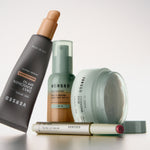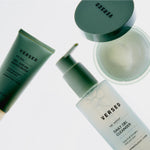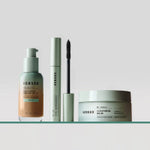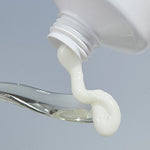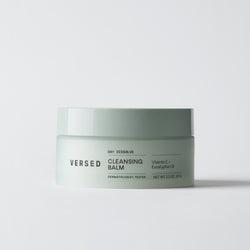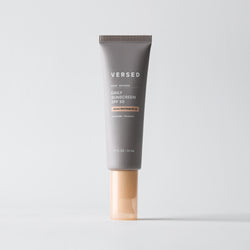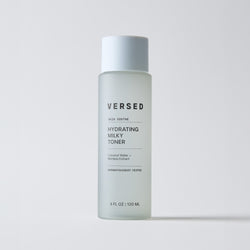Melanated skin is worth celebrating for many reasons, one being that it’s a human experience we all share. That’s right: melanin—the substance that produces pigmentation in the eyes, hair, and skin—is found in almost all of our bodies; some just happen to produce more of it than others. Those with brown or black hair, dark eyes, and/or deep complexions are a few examples of people considered “melanin-rich” or “highly melanated.”
Although an abundance of melanin comes with many perks (did you know it offers natural protection from UV damage?), it’s important to debunk the misconceptions too—because trust us, there are many. Dermatologists Dr. Sharon Belmo, Dr. Janiene Luke, Dr. Anna Chacon, and melanin skin specialist Brandi Andrews educate us on the misconceptions of melanated skin and how to give it the TLC it needs.
WHAT IS MELANIN?
Melanin is a type of polymer derived from the amino acid tyrosine. While genetics determine the level of melanin naturally found in our bodies, hormones, sun exposure, and UV light can also trigger melanocytes (cells that create melanin). That’s precisely how phenomena like dark spots, freckles, and “sun tanning” occur. Melanin does much more than determine the color of our skin, however. It also offers some natural protection against the sun, absorbing about 50-70% of UV rays.
WHAT MAKES MELANIN-RICH COMPLEXIONS UNIQUE?
Some of the biggest misconceptions about melanin-rich skin are that a) they don’t need to wear SPF b) they don’t burn and c) they can’t get skin cancer. Dr. Luke and Dr. Chacon enlighten us on why none of the above is true. “The [amount of] melanin in a person with darker skin equates to an SPF (sun protective factor) of about 13, however, most recommend an SPF of 30 or higher, which blocks 97% of UVB rays,” she says. Not to mention that no matter what hue your skin is, Dr. Chacon stresses that burning and cancer are still a possibility. While Black complexions are less likely to get diagnosed with melanoma, the survival rate is significantly lower for us no matter the stage.
While this is reason enough to protect skin from UV rays, damage (such as dark spots and premature aging) is something else to consider. “Sunlight and visible light can also cause or worsen uneven skin tone, which is very common in melanated skin types,” Dr. Belmo shares. Andrews agrees: “About 60-80% of those with melanated skin have a pigmentation disorder.”
Both Luke and Belmo agree that sunscreen is a must-have for preventing any discoloration commonly associated with melanated skin, including hyperpigmentation, vitiligo (a form of hypopigmentation that’s more prominent in darker skin), acne scarring, and melasma. Unfortunately, many people of color find choosing sunscreen to be daunting, especially since mineral SPF has a reputation for leaving behind a chalky white residue. We took our time formulating (and re-formulating) our Guards Up Daily Mineral Sunscreen to ensure it protects all skin types and tones. Its peachy hue helps neutralize the appearance of a white cast while blending to a natural, skin-like finish.
Some other common skin concerns for melanated complexions include razor bumps, dermatosis papulosa nigra, and acne keloidalis nuchae. While our Buff It Out AHA Exfoliating Body Scrub can help reduce bumps from shaving, the other two conditions may require expert treatment.
HOW TO BUILD A SKINCARE ROUTINE FOR MELANATED SKIN
Every skin type has to consider factors like age, location, and sleep when creating a skincare regimen. Darker tones should add “melanin levels” to that list as well, knowing that pigment plays a major role in how skin concerns show up on their skin. Here are a few things to consider when choosing products for highly melanated skin.
HYPERPIGMENTATION
We already know that stubborn hyperpigmentation and acne scarring are extremely common in melanated skin types, but not all brightening ingredients are safe for darker skin tones. For example, there have been numerous reports that the skin-lightening agent hydroquinone (typically found in bleaching creams) can cause allergic reactions in melanated skin, such as burning and swelling. “Hydroquinone is not safe to use long-term due to the risk of a stubborn type of hyperpigmentation called ochronosis,” Dr. Belmo adds, which can cause blue, black, or gray patches on darker skin tones—worsening the hyperpigmentation that was already there in the first place.
Instead of hydroquinone, opt for skin-safe brighteners such as licorice root, vitamin C, and AHAs. To safely target dark spots, apply Out of Sight’s blend of kojic and tranexamic acid directly onto problem areas to help even out discoloration without any adverse side effects.
DRY, ASHY SKIN
Research shows that melanated skin naturally contains fewer ceramides and more transepidermal water loss (TEWL), two factors that contribute to a weaker moisturizer barrier and dehydration. To combat both of these, cleanse with the Antioxidant Cleanser, which is formulated with a healthy dose of antioxidants to remove dirt and impurities without stripping the skin. Then, follow up with a few drops of the Hyaluronic Hydrating Serum to keep the skin’s moisture barrier soft, bouncy, and strong. (Psst: A healthy barrier function helps protect against the aforementioned hyperpigmentation, too.)
Restore moisture on dry elbows and ashy knees by smoothing on the Press Restart Gentle Retinol Body Lotion every single PM.
DARK CIRCLES
Dark circles aren’t just more common for those who skip out on their 8+ hours of sleep; undereye bags are prominent on melanated skin, too. To brighten dark circles, Dr. Luke recommends niacinamide, a gentle ingredient that prohibits the transfer of pigment from melanocytes to skin cells. Find it, along with vitamin C and coffee extract, in our Vacation Eyes Brightening Eye Gel.
ECZEMA AND PSORIASIS
While there isn’t evidence to support that melanin-rich complexions suffer from inflammatory skin conditions any more than others, psoriasis and eczema are often misdiagnosed in darker skin tones. Why? A lack of representation in dermatology textbooks and scientific research failed to teach many experts that inflammation can show up differently on darker skin tones. For example, eczema and psoriasis are often described as red rashes and patches on lighter complexions, but these conditions can appear purple, gray, or brown on melanated skin.
While the basic treatment plan for inflammation remains the same (look for gentle, pH-balanced, and fragrance-free skincare), keep this in mind when searching for expert advice.
Tap to shop skincare for melanated skin below.
